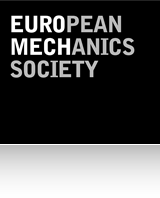629 – Data-driven fluid mechanics
Chairperson:
Luca Magri
Imperial College London
The Alan Turing Institute
London, UK
Phone: +442075941385
Email: l.magri@imperial.ac.uk
Co-chairperson
Ricardo Vinuesa
KTH, Sweden
Peter Schmid
Kaust Country, Saudi Arabia
Luca Biferale
Tor Vergata, Italy
Taraneh Sayadi
Sorbonne University, France
This is a EUROMECH-ERCOFTAC joint event.
Central to data science is machine learning, which is a set of algorithms that allows systems to automatically learn directly from data by finding relations between inputs, outputs and parameters. Machine-learning algorithms have greatly advanced thanks to step changes in computer hardware, efficient algorithms, exa-scale amounts of data, and high-performance computing. Fluid mechanics is one of the original big-data communities. The fluid-mechanics community has been using data-driven and machine-learning techniques to guide large-scale simulations, interpret experimental data, and derive reduced-order models. Examples in fluids are: flow-feature extraction for reduced-order modelling; dimensionality reduction; classifications of wake topology; sparse compressed sensing for wall-bounded turbulence; trajectory analysis and classification of particle-image velocimetry; reconstruction of turbulent flow fields; identification of coherent structures from time-series data; super-resolution of flow fields; flow control; and many other applications, for example, in reinforcement learning and sparse identification. These-machine learning techniques have been applied to benchmark problems with success, but some questions are still open: (i) Do data-driven and machine-learning tools scale to engineering configurations? (ii) How can we gain physical insight and causal relations into the solutions? (iii) Can we extrapolate knowledge to other configurations? The objectives of this workshop are:
- bring fluid dynamicists together to address these questions;
- discuss the emergence and establishment of data-driven methods, machine learning and optimization in fluid mechanics;
- identify challenges to address and establish open datasets for training and benchmarking.
This workshop will bring together communities from turbulence and dynamical systems theory that use data-driven methods. The topics that will be included are (but not limited to):
- Physics-aware machine learning;
- Data assimilation;
- Model discovery;
- Reduced-order modelling;
- Scientific machine learning;
- Digital twins;
- and more!
The conference will take place in London, with exact venue to be announced soon. The conference will be in-person. The possibility of registering for online streaming is being considered and will be announced soon (if we decide to have a hybrid event). Keynote speakers from computer science, fluid mechanics and machine learning will be announced.
- bring fluid dynamicists together to address these questions;
- discuss the emergence of data-driven methods, machine learning and optimization in fluid mechanics;
- identify challenges to address and establish open datasets for training and benchmarking.
